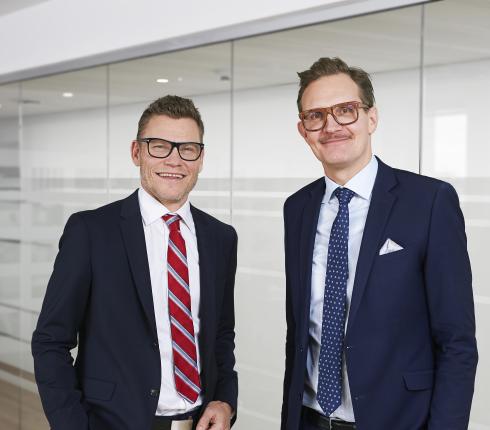NJORD Latvia: conditions of state support for start-ups in Latvia have been improved
Companies qualified as start-ups are eligible for substantial support from the state, either in the form of a reduction in payroll taxes or co-financing the costs on highly skilled employees.

Pursuant to the Law on Aid for the Activities of Start-up Companies (hereinafter referred to as – the “Law”) a start-up company is a capital company in the form of Private Limited Company (SIA) or Joint-Stock Company (AS) with high growth potential, the basic activity of which is related to the development, production or improvement of scalable business models and innovative products.
An innovative product is a product or service with a high added, inter alia, technological val-ue, which ensures the development of a specific new product or service, or a significant improvement of the existing product or service.
The Law provides the following aid measures from the Latvian state:
- applying the payroll taxes’ reliefs for start-up employees and
- an aid program for attracting highly qualified employees.
1. Reduced payroll tax rate
In Latvia, an employee's salary is subject to two taxes: mandatory state social insurance con-tributions (the so-called “Social Tax”) and personal income tax (“Income Tax”).
In 2019, the Social Tax rate was 35.09% (of which 11% is deducted from the employee's gross salary, and the remaining 24.09% is paid by the employer separately), and the Income Tax rate was 20% (for income up to 20,004 euros / year), 23% (for the part of income exceeding 20,004 euros / year, but not exceeding 62,800 euros) and 31.4% for the part of income ex-ceeding 62800 / year.
The object of the Social Tax is the gross salary of the employee (“salary on paper”). The ob-ject of Income Tax is the employee's salary, from which part of the Social Tax (11%), the an-nual non-taxable minimum and benefits for dependents are deducted.
As part of receiving government support, a start-up has the right to reduce taxes on the sala-ries of its employees in the following amount:
- Up to the amount of fixed payment of the Social Tax ("Fixed Payment"), which is es-timated from the amount of two minimum wages established by the Cabinet of Min-isters of Latvia. In 2020 the minimum wage is 430 euros / month, in 2021 it will be 500 euros / month. Thus, in 2021, the amount of the Fixed Payment per month will be 35.09% x 2 x 500 EUR = 350.9 EUR.
- 0% Income Tax.
At the same time, the Law obliges the start-up as an employer to make additional mandatory contributions to the employee's state pension insurance or contributions to the employee's private voluntary pension scheme in the amount of at least 10 per cent of the difference between the gross income accrued for the employee and the object of the Fixed Payment.
2. Attraction of skilled employees
A start-up has the right to apply for a support program to attract skilled professionals and receive a refund from the state in the amount of 45% of its expenses on salaries paid to employees and taxes paid from salaries.
To obtain state support, the attraction of skilled professionals should pursue the following goals only:
- specific research activities;
- solving technological problems or developing new or significantly improved products and technologies.
A highly qualified employee is an employee who has obtained:
- relevant higher education (master's degree or equivalent education in natural science, mathematics, IT, engineering sciences and technology, design, manufacturing, and processing);
- professional experience of at least 3 years in the planned field of employment.
3. Criteria for granting aid programs to the start-ups
Compared to the original "strict" version of the law, the current version (in force from 16 September 2020) has minimum requirements for start-ups that plan to qualify for participation in the support program.
General requirements:
а) no ongoing insolvency proceedings;
b) the start-up tax debt does not exceed 150 euros.
c) compliance with the concept of a start-up.
From 16 September 2020, the criterion for obtaining investment from a qualified investor in the capital with an early stage of risk is no longer mandatory. Thus, a start-up can apply for support if it provides information that certifies the development, production, or improvement of an innovative product.
After receiving an application from a start-up, a special committee for evaluating the activities of start-ups (hereinafter referred to as the “Committee”) may request from organizations representing start-ups an opinion on the compliance of a start-up with the concept of a start-up in the meaning of the law. In other words, organisations representing start-ups must assess whether a given company - a candidate for support - has high growth potential and whether its main activities are related to the creation, production or development of scalable business models and innovative products. The Cabinet of Ministers of Latvia shall establish the procedure within the frames of which the Committee requests and evaluates the said information.
4. Participation in the aid program
A start-up wishing to participate in the aid program must submit the following documents to the Committee:
- application for participation in the aid program;
- Business plan of the declared business idea;
- (for start-ups wishing to exercise the right to receive support in attracting in-vestments) confirmation of capital investment with an early stage of risk from a qualified venture investor.
The form and content of the aforementioned documents shall be determined by the Cabinet of Ministers.
Information on the provision of a support program to a start-up or on the loss of the right to use support programs is published in the register of supported start-ups, which is maintained by the Secretariat of the Committee and published on the website of the Secretariat of the Committee (The Register of State Aid for the Start-up Companies | Investment and Development Agency of Latvia (liaa.gov.lv).
A decision of the Committee to grant aid program shall be made within a month from the day of receipt of the documents from the start-up.
5. Other advantages for start-ups in Latvia
O% Corporate Income Tax: since 2018, Latvia has introduced a 0% tax on reinvested profit of enterprises, i.e., corporate income tax is paid only when dividends are distributed.
Start-up visas: foreigners - founders of a start-up can apply for a special residence permit (the so-called “start-up visa”), which gives the right to move to Latvia together with family.
Blue Card: foreigners – skilled professionals of a start-up are given the right to obtain a residence permit with the right to work – the European Blue Card (for persons who have obtained higher education under an educational program of at least three years in the relevant field of expertise or have relevant professional experience of at least five years). Terms of issue of the Blue Card - 5 working days and 10 working days.
Latvian legislation also provides some benefits for IT professionals, for example, the requirements for minimum wage (and, accordingly, taxes paid from it) have been reduced.
































